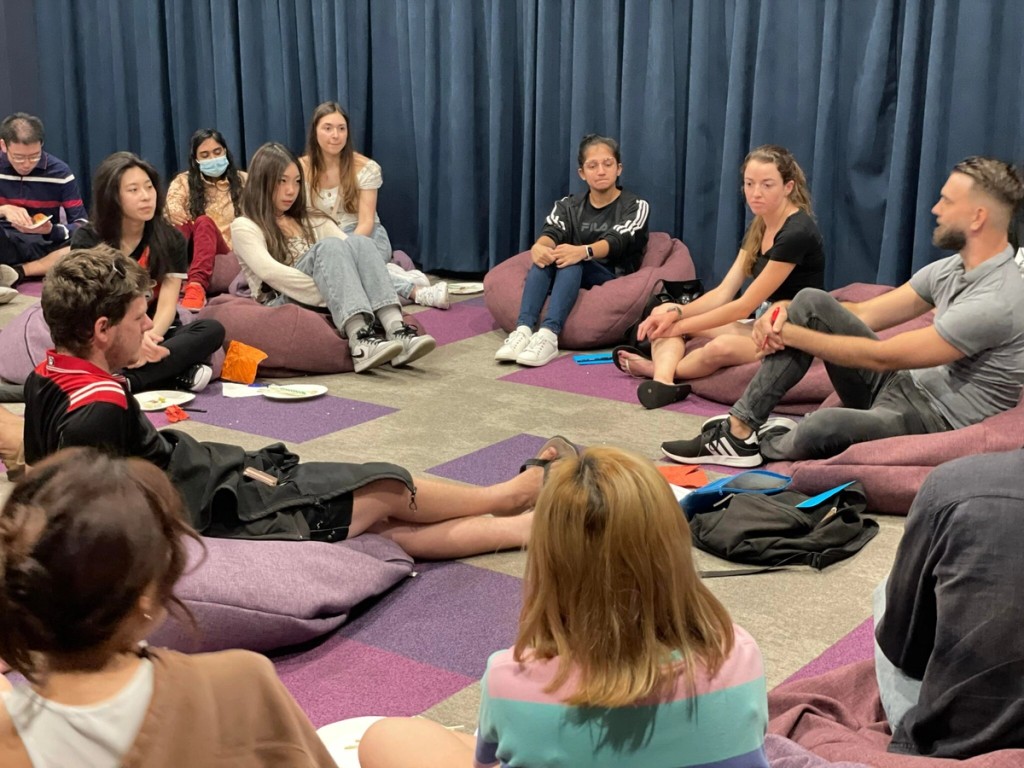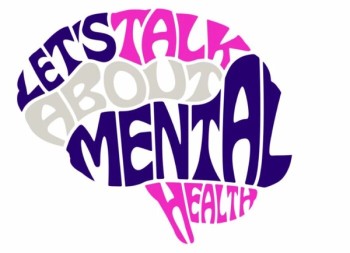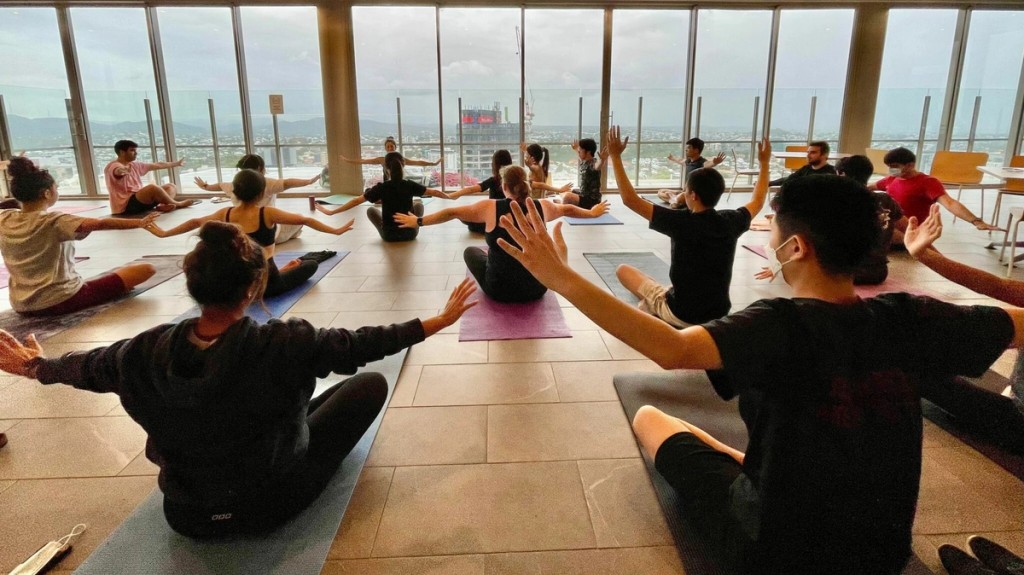23 May, 2023
How to stay Mentally Healthy
Life as a student can be stressful — you don’t need us to tell you that. But we wanted to help, so we have put together some tips and tricks about creating healthy habits, practicing mindfulness and when it’s time to reach out for help. Read on for the tips!
Wellbeing & recreation
Student life

Let’s be honest — by now, we all know mental health is important for our overall wellbeing. More than how it affects how we feel, act and even care for our physical health, it also determines how we handle stress, make choices and relate to others.
But why is mental health so important for students? Well, because of its undeniable impact across our entire being. Learning how to care for our mental health early on can have a really positive impact on the rest of our lives. Understanding things like how you handle stress, what your triggers are, what mechanisms work for you and then turning the best practices into habits will only help you later on.
Importantly, it will also help you now as you navigate life as a student.
So here, we’ve condensed some of the best advice for those wondering how to improve student mental health.

“It’s never too early to reach out for help.”
Your mental health never has to get to a certain severity, saying we all deserve help. You might have questions like, ‘Hey, I’m feeling lonely and I don’t know what to do about it.’ Or it can be, ‘Hey, I just broke up with my boyfriend or girlfriend and I don’t know how to handle it.’ It can even be, ‘I’m not feeling great and I don’t know what it is.’ All of that is important and valid.

Life + Wellness Coaching session at Student One
Practicing mindfulness is important
Mindfulness means being in the present — not being in the future or the past. So if we’re thinking about this assignment that we have tomorrow, or what we said to that friend yesterday, and if she maybe likes me, then those are two moments in the past, through the future. So it’s really being in here and now, and there are sensory tools you can use to ground you in the moment:
– What do I see right now?
– What do I smell right now?
– What do I hear right now?
– What do I feel right now?
– What do I taste right now?
So it’s more a sense of, ‘Hey, what I’m actually doing right now?’ Mindfulness allows you to enjoy what you’re doing in that moment, because maybe you are actually listening to really nice music, but you were thinking about that conversation from yesterday. So now you’re ruminating and not able to enjoy that music, or the food you’re eating, or to notice the person who walks by wearing those really funky sneakers. It allows your mind to rest, but also to indulge in enjoyment, and those are two big benefits.
Learn to recognize stress
Stress isn’t always just nail-biting before an exam and heart-pumping adrenaline before a presentation, it can be more nuanced. Stress can also manifest in small ways, like if you drop your pencil and you realize you’re really angry about it. Sometimes there are emotions or thoughts bothering you that you aren’t totally aware of.
Writing exercises, like keeping a journal, are a great way to work through your emotions and figure out what you’re thinking and analyse what you’re doing. When you write it down, you can look at it and realize, ‘Oh, this is what I am thinking, and I did that because of these unconscious thoughts.’
How to improve student mental health: meditation and mindfulness apps
One of the most important things to remember is that becoming mentally healthier shouldn’t be seen as a goal, but an ongoing journey and a practice. Mindfulness and meditation are two great tools to help you along on your journey, as they help you centre with yourself in a meaningful and authentic way.
But, actually practicing meditation and mindfulness is tough, as it requires a lot of discipline and practice. Luckily, there are some really great apps out there to help guide you through it in a way that feels approachable. Using these apps, you can learn to incorporate healthy meditation and mindfulness practices into your life that feels sustainable, ultimately helping you create healthy habits that can improve your mental health.
Headspace
The Headspace app provides hundreds of guided meditations to help users with everything from stress and focus to sleep, anxiety and relationships. The meditations, which you can get delivered to your phone daily, come in the form of stories, soundscapes and even music, allowing you to try out different meditations to find out what works best for you.
You also have the comfort of knowing Headspace has been proven to help others — one
study by Headspace finding that 4 weeks of using their app can increase focus by 14%, while another showed that just a single session cuts mind-wandering by 22%. Another study showed that 30 days of Headspace resulted in an 11% increase in mental resilience, and people who used the Headspace app for just 10 days experienced a 7.5% increase in satisfaction with life
Those stats are promising, right? By just setting a few minutes aside every day to let go, breathe and recharge, Headspace can help you improve your student mental health.
Mo
Designed for beginners, Mo’s first lessons start at just 4 minutes to ease you into the practice of meditation. At Mo, they believe that to make it a habit, you have to start slow with daily meditations that feel easy to incorporate into your life. Eventually, adding longer meditations into your practice.
With programs that are designed specifically for different mentalities, Mo helps users with stress, concentration, productivity, happiness, gratitude and self-esteem. They even have meditations for sleep, and bedtime stories to help you fall asleep gently and deeply.
Calm
With nearly 1.5 million reviews in the Apple App Store, Calm is one of the most popular and helpful sleep and meditation apps available. With guided meditations ranging from of 3 to 25 minutes, you can choose the right meditation to help you experience better sleep and lower stress and anxiety through their sleep programs. They’ve even been able to swing Hollywood talent for their sleep stories like Bob Ross and Matthew McConaughey!
But, Calm also helps users with mindfulness, offering everything from breathing exercises to stretching practices and mindfulness meditations that focus on a range of topics like breaking habits, non-judgement, forgiveness, and gratitude. Calm even has videos for mindful movement, masterclasses, soundscapes, entire music libraries and the 10-minute daily Calm to ease you into the day or unwind you before bed.

3 easy practices for university student mental health
1. Yoga
Research shows that exercise that contributes to cardiovascular health leads to better emotional stability and reduced anxiety. And we all know that endorphins give our minds a mental boost. But yoga exercise is especially helpful in reducing stress and anxiety because of its methodical practice — making you slow down, breath, hold poses and pause.
There’s a mental strength that accompanies yoga in a way that feels more present than some high-intensity sports, as you have to continually tell yourself to hold that pose, to control your breathing and to ease into a new posture. This mindfulness is important, and can help you recentre and maybe even deepen your other mindfulness and meditation practices.
And hey, with free yoga classes on offer every week our ResLife team got you covered!

2. Journaling
Journaling is a great tool that allows you to reflect and process your throughs and emotions. Sifting through these complex feelings can help you relieve stress, identify problems more clearly and improve your self awareness.
Journaling can even promote positive thinking, allowing you to focus and declutter your mind. So remember, journaling isn’t just for when you’re feeling sad, stressed or anxious, it can be used as a daily ritual to help you support your overall mental wellbeing.
Our tip: Start slow. Like with any habit, it takes practice. Start journaling for a just couple minutes every day, or even once a week to start, asking yourself questions like how you’re feeling, what stressors you’re facing or what’s bothering you. You can focus on the good, too, which is great for mindfulness — like what made you smile that day, or a weekly highlight.

just doing the old Harlem Shake
3. Listen to music and dance!
Yep, you read that right. Dancing can actually offer a lot of mental health and brain-function benefits like improving self-esteem, improve mood and attitude, and even ease depression and anxiety. And that makes sense, right? Can you remember the last time you danced and felt angry? We didn’t think so.
Of course, music is also a great way to relax yourself and simply enjoy something that makes you happy. Acting as a mood booster that can drown out distractions, listening to music is a great practice for mindfulness as well as studying
We love lo-fi music because it has a relaxing effect and nice tempo to keep listeners engaged without getting sleepy. There’s no lyrics either, which means fewer distractions for reading, comprehension and writing.
How to get help for mental health problems
Of course, if you ever feel like you are in serious need or are suffering, seek professional help right away. Don’t wait to get in contact with your GP or your mental health professional if you already have one. Acting quickly on your instincts if something doesn’t feel right, or you feel you may be of harm to yourself or others is key to keeping yourself safe.
As always, we’re here for you. We’ve always got your best interest at heart and are always looking for ways to make your student life better and easier.
Share this post